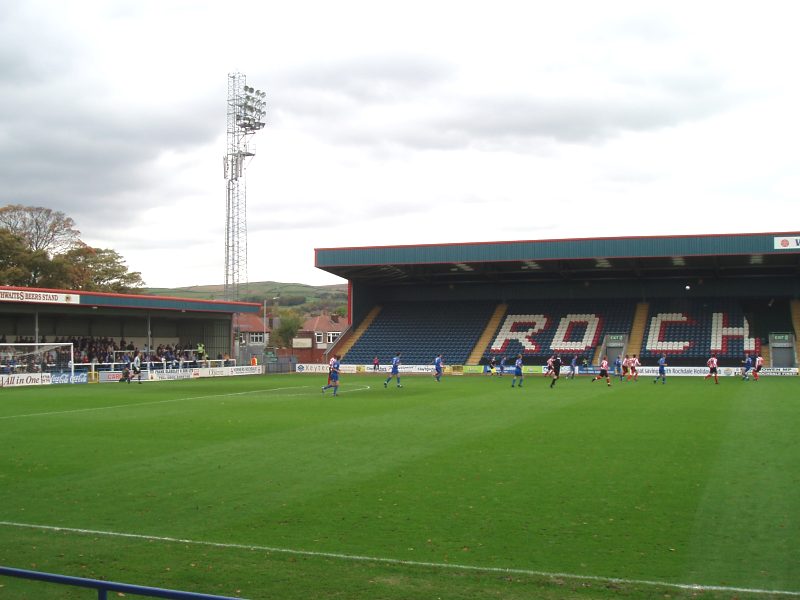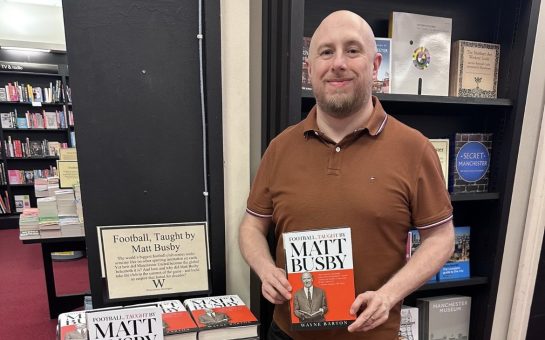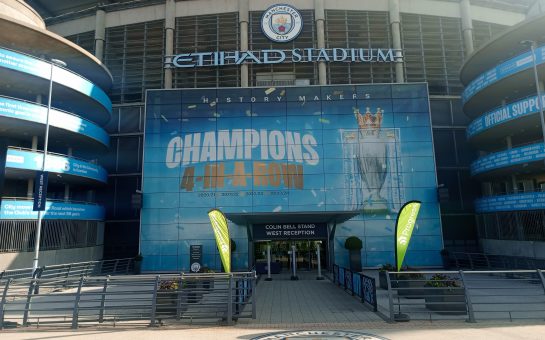Rochdale AFC were thrown a lifeline last night following months of financial uncertainty – and the club’s sale could provide a blueprint for other clubs who are facing bankruptcy.
The club, which was at risk of liquidation, will be sold to a trust set up by local businessman and entrepreneur Sir Peter Ogden.
He has pledged to give all profits to the club’s community trust and intends on introducing the Golden Share, an initiative which offers legal powers to those who are emotionally invested in the club – with Rochdale being managed by the Dale Trust.
Ogden said: “Our family has a deep connection to Rochdale, and we envisage the club becoming an integral part of the local community.
“We do not underestimate the challenges that lie ahead, and we will work tirelessly towards achieving our ambitions.”
Small clubs like Rochdale have traditionally been the cornerstone of local communities, and Ogden’s promise underpins the understanding that the relationship between the fans and the club is integral to the beautiful game.
The enormous success of the Premier League, and its record breaking £6.7 billion television deal, has channelled enormous power and created a wealth inequality which some blame for pushing a number of smaller clubs towards extinction.
From Torquay to Reading, and from Carlisle to Morecambe, the potentially unsustainable nature of football’s financial landscape has become painfully evident.
“There are lots of clubs around the country that are living on the edge of the volcano,” said Christopher Harrison, a lifelong Rochdale fan who sat on the club’s board as a non-executive member.
All these clubs spread across the country are victims of what many people view as football’s unsustainable model, and they believe the government holds the antidote. So, why are they withholding it?
With the pyramid continuing to bounce from one crisis to another, former Sports Minister Tracey Crouch MP chaired an independent fan-led review of football governance which produced an 11-chapter protocol to protect the nation’s favourite pastime.
Following its release in 2021 the project filled grassroots clubs with hope.
The commitment to the fan-led review’s recommendations will grant supporters greater engagement, provide an independent regulator, and redistribute wealth while overseeing ownership appointments by placing them on licence.
But a lack of urgency means any decision now could be too late for some. The legislation was set out as a topic of debate in Parliament this year, with the government committing to the fan-led review’s recommendations last week.
The issue is, therefore, not a matter of ‘what’ but ‘when’.
What does this mean for the clubs currently in danger? A minimum six-month delay in enacting new government legislation could prove fatal for securing any semblance of a future.
The fan-led review centred on the role of an independent regulator which would act as a dynamic entity capable of swiftly addressing football’s challenges and updating regulations as required. By embedding robust legal foundations within the regulators’ DNA, it hopes to ensure the establishment of a system with unparalleled strength.
Caroline Parker is a lifelong Reading fan who grew up just ten minutes away from their former home, Elm Park. But as the club has fallen into disarray under Chinese owner Dai Yongee, she now acts as a representative for fan group ‘Sell Before We Dai’.
She said: “It is never too late for a regulator. I think, if anything, this season has proved what a farce it is when you have independent panels deciding league positions in the Premier League and in the Championship because they don’t apply the rules consistently.”
Yet this idea does not come without its critics. Namely the Premier League, which has made no secret of its opposition to the independent regulator and intends on passing responsibility to the FA.
Parker added: “The EFL and the Premier League have shown they can’t govern themselves.
“They can’t decide what to do, they can’t have consistent punishments, they are not clear on how they apply the rules and what punishments they are going to give out.
“It is an absolute mess this year and 2023/24 will go down as the points deduction season in the Premier League and EFL with all the issues we have got.
“This has proven without any shadow of doubt that they can’t self-regulate and an independent regulator is needed because we have to protect clubs.”
But it is not just regulation the Premier League opposes. The fan-led review recommended in its ninth chapter that “the Premier League should guarantee its support to the pyramid and make additional, proportionate contributions to further support football”.
However, football finance operates as a business and Premier League chief executive Richard Masters last year expressed concern that allocating a significant portion of the revenue to a struggling division like the Championship “would be disastrous”.
But when promotion to the Premier League pays out more than 200 times that of the yearly revenue of clubs like Rochdale, it begs a questions of fairness.
University of Liverpool football finance expert Kieran Maguire said: “The accusations made by the likes of Angus Kinnear and Karen Brady and so on is that we are going to move to some dystopian society, (where) everyone’s on the same wage. That simply isn’t the case.
“There is nothing like that and I don’t know where some of these comments come from. Football is a health issue, it’s a mental health issue and it’s something that gives enjoyment. Nobody is saying it is something that should be fully funded by the Premier League.”
And fans throughout the pyramid were relieved to finally hear the government say money in football is unfairly distributed.
Harrison said: “The Premier League should guarantee its support to the pyramid by making additional proportional contributions to support football.
“So it is not to say you are getting handouts, but it is to say that League One and Two clubs will get something nearer to a fairer share of the revenues, and that is not happening at the moment.
“All the money stays in the Premier League and even within that a lot of the money stays in the top six.”
But if no money is currently coming out of the Premier League, then how can these clubs survive? It’s seemingly all in the hands of the playboy owners and their shiny new toys.
The review emphasises the necessity of implementing a licencing regime as a primary method to evaluate clubs’ financial stability and their adherence to other mandates outlined by the regulator. Initially, these licences would be provisional, eventually transitioning to permanent status, subject to revocation in cases of consistent and intentional non-compliance. The regulator would wield authority to compel owners to divest or sell their stake, and would possess the capability to ban owners permanently when necessary.
For Caroline’s cherished Reading FC, this development couldn’t arrive soon enough as owner Yongge had made repeated efforts to dismantle the club in the face of looming liquidation.
She said: “I think they have obviously tightened up their protocol and their owners and directors test, and unfortunately football attracts a lot of murky people because of the nature of the business.
“The problem you have got is that if you don’t do something about wealth distribution, you’re always going to get stupid owners like Dai who come in, chuck a load of money at it, it could go well, it could go tits up.
“Then all of a sudden they’ve bet the house and it has come in on the wrong number, and they’ve decided ‘I’m packing up my toys I don’t wanna play anymore’. Then you are just left with all this debt and no future.”
As the future of Rochdale looks safe for now, many feel there is a desperate need to push this legislation through. The club makes annual losses of more than £1.5 million.
But with the takeover injecting new cash into the side, a return to the Football League looks like a realistic possibility and gives new hope to the success of the fan-led review throughout the pyramid.
Feature image: Boothman – wikicommons.




